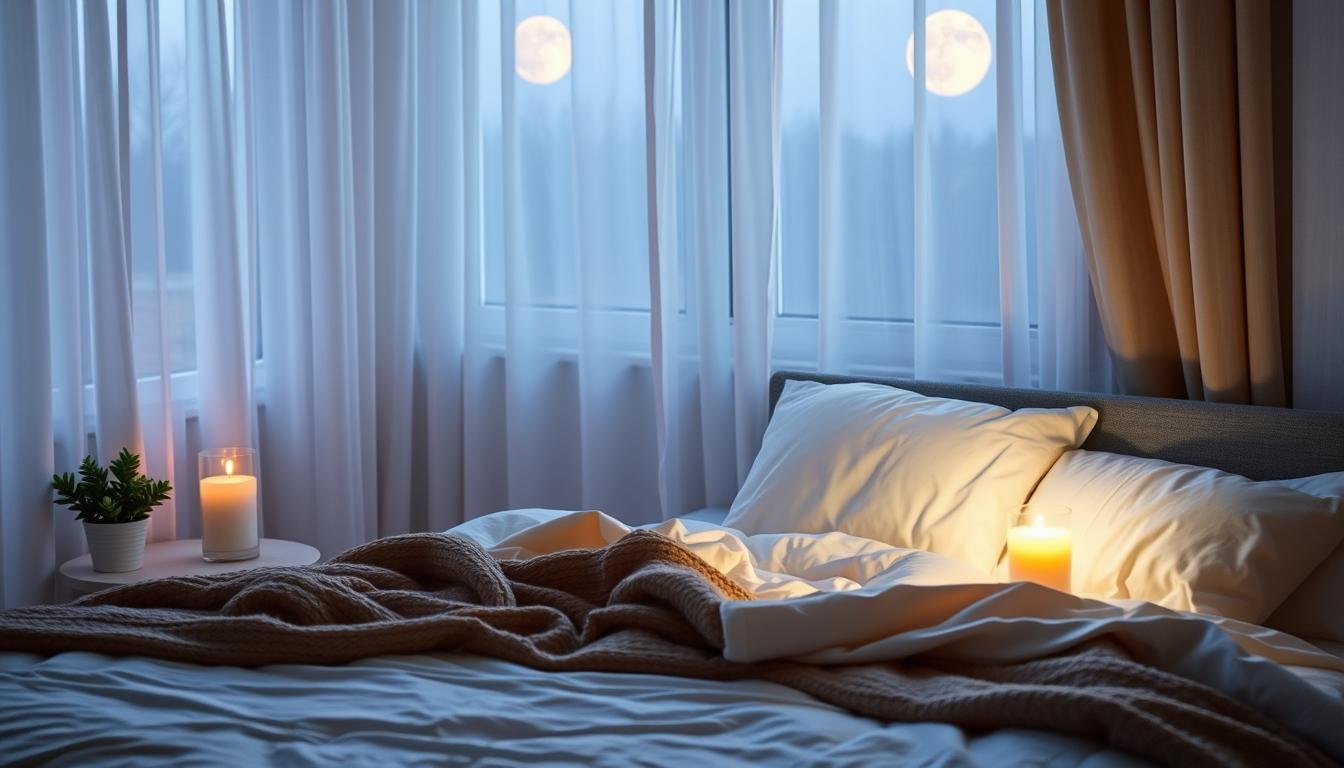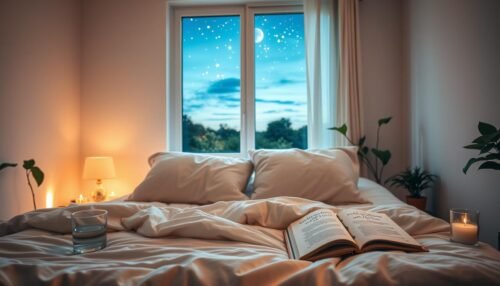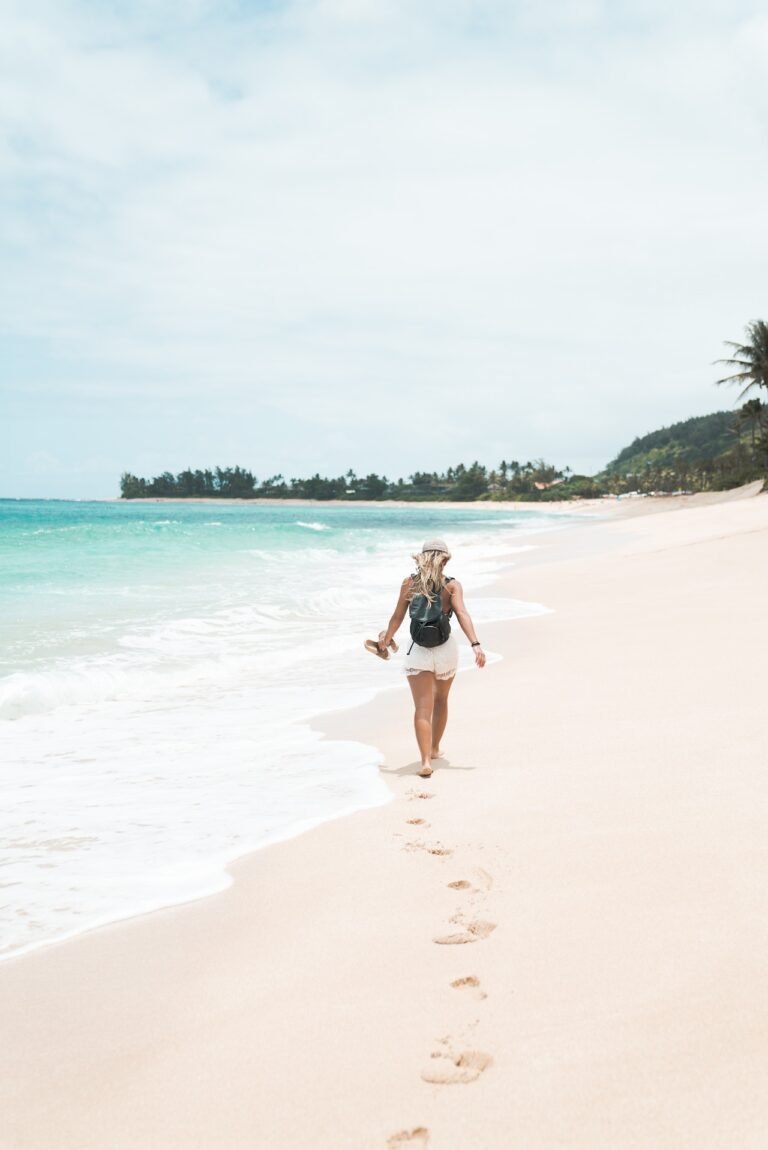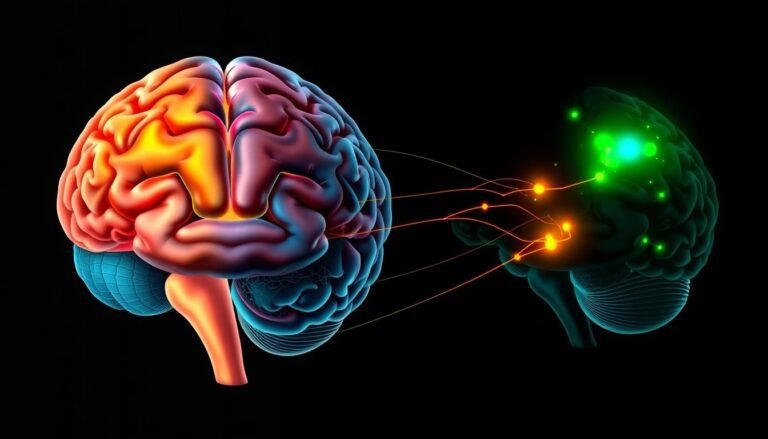Sober Sleep Tips: Improving Your Sleep Quality Without Alcohol

Are you tossing and turning at night, struggling to catch those elusive Z’s without a nightcap? You’re not alone! Did you know that 35-70% of people in early recovery experience sleep disturbances? Yikes! But don’t worry, I’ve got your back. In this article, I’ll dive into some game-changing sober sleep tips that’ll have you snoozing like a pro in no time. Say goodbye to counting sheep and hello to sweet dreams!
For those quitting alcohol, good sleep habits are crucial. At first, sleep might be tough. But, the long-term gains are huge. You’ll feel clearer, more energetic, and motivated.
Improving sleep quality means sticking to a schedule, getting sunlight, and having a dark room.
Good sleep habits are a way to care for yourself. It’s time to enjoy the benefits of sober sleep. Wake up feeling refreshed and ready for the day.
The Connection Between Alcohol and Sleep
Alcohol and sleep have a complex relationship. Nearly two-thirds of Americans drink alcohol, often as a bedtime habit. While it might seem like a nightcap helps you drift off, the reality is quite different.
How Alcohol Affects Sleep Cycles
Alcohol disrupts your sleep architecture. It causes more deep sleep early in the night but less REM sleep. This leads to fragmented sleep patterns and frequent waking in the second half of the night. Even small amounts of alcohol can decrease sleep quality by up to 9.3%.
The Impact of Alcohol on REM Sleep
REM sleep is crucial for memory and learning. Alcohol suppresses this vital stage, especially in the first half of the night. This disruption can affect your circadian rhythm in sobriety, making it harder to maintain a regular sleep schedule.
Short-term vs. Long-term Effects of Alcohol on Sleep
In the short term, alcohol might help you fall asleep faster. But it leads to poor quality sleep and next-day fatigue. Long-term alcohol use is linked to chronic sleep disorders in addiction recovery, including insomnia and sleep apnea. Up to 72% of people seeking alcoholism treatment report sleep problems.
Experts recommend avoiding alcohol at least 3 hours before bed to improve sleep quality. Remember, while alcohol might seem like a quick fix for sleep issues, it often makes them worse in the long run.
Benefits of Sober Sleep

Sober living sleep can change your life. It is key for recovering addicts to stay well and succeed. Let’s look at the amazing benefits of sober sleep and how it helps with sleep issues in recovery.
Deeper and More Restful Sleep
Sober sleep means better rest. Without alcohol, your body sleeps better. This helps your brain and body fix problems.
It makes you smarter and better at making decisions. These skills are important for those in recovery.
Reduced Nighttime Wakefulness
Drinking less means less waking up at night. You’ll go to the bathroom less and sweat less. This helps your body fix itself and keeps your mood stable.
Improved Energy and Focus During the Day
Sober sleep means more energy and focus. You’ll be more alert, motivated, and creative. These are great for those fighting sleep issues in recovery.
It helps you feel better and do more. By focusing on sleep, you’re caring for your health. Sober sleep can make you healthier and happier. Start using these tips to help your recovery and reach your goals.
Common Sleep Challenges After Quitting Alcohol

Stopping alcohol can bring many benefits. But, it can also mess with your sleep. Many people struggle with insomnia in sobriety, especially at first. It’s important to understand these challenges to manage sleep and stay well.
Initial Sleep Disruptions: What to Expect
When you stop drinking, your body needs time to adjust. Insomnia often starts within a day or two and can last up to 10 days. This is because alcohol changes how your brain handles sleep. Your body must learn to sleep naturally again.
Coping with Insomnia and Restlessness
Dealing with sleepless nights is hard, but there are ways to cope. Setting a regular sleep schedule before quitting helps your body adjust faster. Avoid caffeine and nicotine, as they can make sleep problems worse. Exercise for at least 30 minutes a day to help sleep better. Remember, insomnia in sobriety is common, affecting up to 72% of people in alcohol recovery.
Managing Night Sweats and Vivid Dreams
Night sweats and intense dreams are common in early sobriety. These symptoms can mess with your sleep-wake cycle. To manage them, keep your bedroom cool and use breathable bedding. If vivid dreams keep you up, talking to a therapist might help. With time and proper care, your sleep quality will improve, supporting your journey to lasting sobriety.
Tips for Improving Sleep Quality Without Alcohol
Quitting alcohol can make sleep hard. It’s key to start bedtime routines without alcohol. Good sleep habits are important for those recovering from addiction. Let’s look at ways to improve your sleep nights.
Establishing a Consistent Sleep Routine
Go to bed and wake up at the same time every day. This helps your body get into a rhythm. Turn off lights and screens an hour before bed to tell your brain it’s time to relax. A warm bath or some light stretching can also help you get ready for sleep.
Creating a Relaxing Bedtime Environment
Make your bedroom a place for sleep. Keep it cool, dark, and quiet. Use curtains or an eye mask to block out light. White noise machines can help block out sounds. Get a comfy mattress and pillows for the best sleep.
The Role of Diet and Exercise in Promoting Sleep
What you eat and drink affects your sleep. Stay away from caffeine and big meals before bed. Try sleep-friendly foods like cherries or warm milk. Exercise is good, but do it in the morning or afternoon. Avoid hard workouts before bed.
Natural Supplements and Sleep Aids
Think about using natural sleep helpers like melatonin or valerian root. They can help your sleep cycle without the dangers of alcohol. Always talk to a doctor before trying new supplements. Remember, it takes time to get used to new sleep habits.
Mindfulness and Relaxation Techniques for Better Sleep
Using mindfulness for better sleep can change your nights. These methods calm your mind and get your body ready for sleep. Let’s look at some good ways to make your sleep better.
Guided Meditation and Deep Breathing Exercises
Meditation is a strong tool for better sleep in recovery. It means focusing on your breath and letting go of worries. Try a 10-minute guided meditation before bed. Deep breathing also helps relax you. Breathe in slowly for four counts, hold for four, then breathe out for four.
Progressive Muscle Relaxation for Stress Relief
This method is great for managing stress for sleep in recovery. Start by tensing and then relaxing each muscle group in your body. Begin with your toes and move up to your head. It helps release tension and gets your body ready for sleep.
Journaling and Visualization Practices
Writing down your thoughts before bed can clear your mind. Spend 5-10 minutes writing down any worries or thoughts from your day. Visualization also helps sleep. Imagine a calm, peaceful place in your mind. Think about the sights, sounds, and smells. These mindfulness practices for sober sleep can really help your sleep quality.
When to Seek Professional Help
Sleep troubles often last after quitting alcohol. If you can’t sleep well for over a month, get help. Studies show insomnia is five times more common in early recovery.
Identifying Sleep Disorders
Long-term sleep problems might hide other issues. Look out for signs like trouble falling asleep, waking up a lot at night, or feeling tired during the day. These could mean sleep apnea or severe insomnia.
Exploring Therapy Options
Cognitive behavioral therapy for sleep is a great way to fight insomnia in recovery. It changes negative thoughts and behaviors that keep you awake. Therapist-guided sleep programs offer custom tips to improve your sleep.
Sleep support groups are also helpful. They let you share your story and learn how to sleep better. These groups are full of people facing the same issues, offering support and advice.
Untreated sleep problems can slow down recovery and raise the chance of relapse. Getting help is not weak – it’s wise. Reach out to doctors or addiction experts for help on your journey to better sleep and sobriety.
Conclusion
Sober sleep is a path to better health and happiness. Alcohol messes with our sleep, causing many problems. To get good sleep, we need to learn and use sober sleep tips.
Embracing the Benefits of Sober Sleep
Good sleep habits are key to health. The Substance Abuse and Mental Health Services Administration says 25% to 72% of people with alcohol use disorders have sleep issues. By following sober sleep tips, you can sleep better. This means you’ll feel more awake, have more energy, and be healthier.
Staying Committed to Healthy Sleep Habits
Being consistent is important for better sleep. Create a calm bedtime routine, keep your room dark and cool, and sleep at the same time every day. Remember, sleep problems can last for a long time after you stop drinking. Stay patient and keep up with your new habits.
When I stopped drinking, my sleep got better. It didn’t happen right away, though. The first few weeks were hard. I had trouble falling asleep and stayed awake a lot.
After about a month, things started to improve. I noticed some changes:
- I started having dreams again. Before, I rarely remembered any dreams.
- Waking up became easier. I didn’t feel sick or tired like I used to.
- During the day, I had more energy. I could focus better at work.
It wasn’t always easy. I had to learn new ways to deal with stress without alcohol. Some of the tips I’ll share later helped me a lot. Things like deep breathing and writing in a journal made a big difference.
One good thing is that I now have a regular sleep schedule. I go to bed and wake up at about the same time each day. My body seems to know when it’s time to sleep.
It took time, but my sleep is much better now. If you’re trying to quit drinking, know that your sleep can get better too. It might take a while, but it’s worth it.
By using these tips and embracing sober sleep, you’re taking a big step towards recovery and health. Your journey to better sleep and a healthier life begins now. Sweet dreams!
Source Links
- https://adf.org.au/insights/drink-less-sleep-better/ – Drink less, sleep better, feel healthier
- https://sober.com/blog/why-sober-sleep-is-better-sleep/ – Why Sober Sleep is Better Sleep
- https://www.therecoveryvillage.com/alcohol-abuse/sleep-without-alcohol/ – Can’t Sleep without Alcohol? Drinking to Fall Asleep: Insomnia & More
- https://www.sleepfoundation.org/nutrition/alcohol-and-sleep – Alcohol and Sleep
- https://www.ncbi.nlm.nih.gov/pmc/articles/PMC2778757/ – Alcohol’s Effects on Sleep in Alcoholics
- https://www.ncbi.nlm.nih.gov/pmc/articles/PMC5821259/ – Alcohol and the Sleeping Brain
- https://isaiah-house.org/the-importance-of-sleep-in-addiction-recovery/ – The Importance of Sleep in Addiction Recovery – Isaiah House
- https://www.vogue.com/article/what-happens-when-you-stop-drinking – Here’s What Happens When You Stop Drinking
- https://www.spartan.com/blogs/unbreakable-nutrition/how-staying-sober-may-boost-sleep-quality – How Staying Sober May Boost Sleep Quality
- https://www.palmerlakerecovery.com/alcohol-abuse-and-addiction/alcohol-withdrawal-insomnia/ – Alcohol Withdrawal Insomnia: How To Get To Sleep During Detox
- https://www.midwestrecoverycenters.com/insomnia-after-quitting-alcohol/ – Insomnia After Quitting Alcohol: How Long Do Sleep Issues Last
- https://www.southjerseyrecovery.com/alcohol-abuse/sleep-without-alcohol/ – Achieving Restful Sleep Without Alcohol – The Recovery Village Cherry Hill at Cooper
- https://www.encorerecovery.com/how-to-sleep-without-alcohol/ – Learning How to Sleep Without Alcohol – Encore Outpatient
- https://www.womensrecovery.com/womens-rehab-blog/14-ways-to-fall-asleep-naturally/ – How to Naturally Fall Asleep While Being Sober
- https://recovery.com/resources/how-to-sleep-better-tips-for-restful-nights-and-energized-mornings/ – How to Sleep Better: Tips for Restful Nights and Energized Mornings – Recovery.com
- https://www.addictioncenter.com/community/insomnia-detox/ – 7 Tips For Dealing With Insomnia During Detox
- https://luminarecovery.com/resources/how-to-fall-asleep-when-sober-sleep-hygiene-sobriety/ – How to Fall Asleep When Sober: Sleep Hygiene & Sobriety – Lumina Recovery
- https://www.verywellmind.com/sleep-problems-in-recovering-alcoholics-63200 – Sleep Problems After You Quit Drinking
- https://www.ncbi.nlm.nih.gov/books/NBK591812/ – Chapter 12 Sleep and Rest – Nursing Fundamentals
- https://pa.highfocuscenters.com/sleep-hygiene-in-recovery/ – Practicing Sleep Hygiene in Recovery | High Focus Centers Pennsylvania






